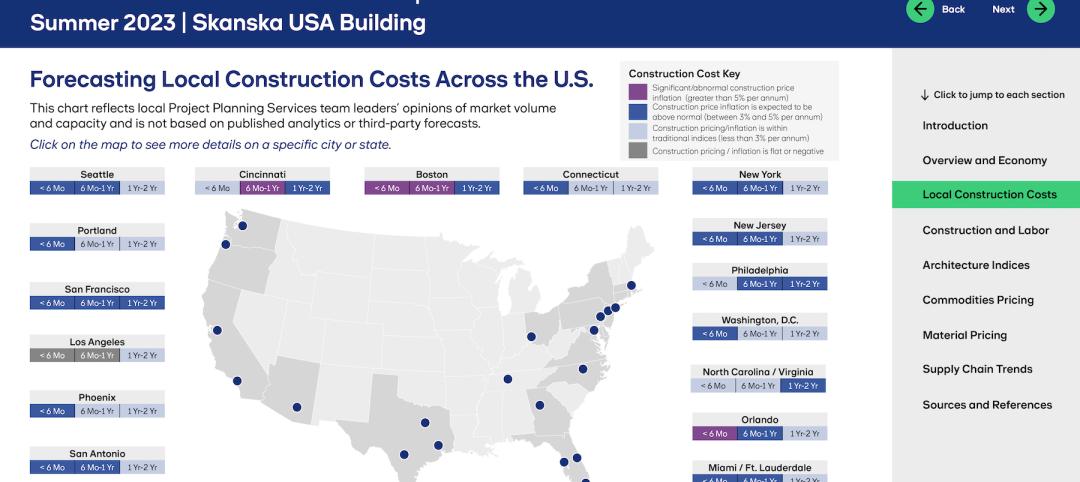Altus Group Limited (“Altus Group”) (TSX: AIF), a provider of software, data solutions and independent advisory services to the global commercial real estate industry, recently released the Altus Group Real Estate Development Trends Report, which provides an outlook of a global property development industry being hit by rapid change from disruptive market forces that did not exist a few years ago or have evolved substantially.
According to the report, which is based on a global survey of more than 400 property development executives, 68% said cost escalation is the biggest business challenge they are facing over the next five years. Several related factors account for this, which in combination are creating a ‘domino effect’ for developers:
- 34% of developers view cross-border trade policy as having a negative impact on the industry as uncertainty continues about future implications stemming from international tariffs and trade agreements
- 65% of developers are facing challenges with labour shortages, which are exacerbated by government policy and booming demand
- 60% of developers are concerned about the development approval process which is often complex and protracted
“It’s clear from the report that the global development sector is facing an increasingly complex set of challenges and rapid change, from escalating construction costs through to a sea-change in the development financing environment,” said Bob Courteau, Chief Executive Officer, Altus Group. “However, development leaders clearly see significant opportunities to manage risk and take advantage of changing conditions through a number of future-ready strategies including investments in technology and performance management along with consideration of new ways of managing and financing projects.”
When asked about the impact of emerging technologies on the property development industry, many respondents expressed a significant degree of uncertainty around some technologies that are experiencing successful application and adoption in other industries. Only a minority of respondents recognized a potential for major disruptive change with certain technologies:
- 3D printing – 65% see little to no impact / 16% anticipate major disruptive change
- Process automation – 56% see little to no impact / 22% anticipate major disruptive change
- Augmented reality/Virtual reality – 45% see little to no impact / 20% anticipate major disruptive change
Development industry leaders seem to have significant reservations about the potential impact of 3D printing, a rapidly evolving technology which is already being applied successfully to smaller scale development projects in countries such as China, Netherlands and USA.
Respondents, however, appeared to acknowledge the potential of more established technologies. Smart building technologies were regarded as the most disruptive, with 49% expecting major disruptive changes, and 42% anticipating a significant impact on efficiencies and how development is conducted.
Finally, the report also indicated a decade-on shift since the financial crisis in financing patterns, away from traditional and institutional lending, with 82% of respondents reporting they were utilizing at least one source of alternative financing while 46% are using traditional or institutional financing. Further, over 45% indicated they were considering, planning or utilizing some form of alternative financing exclusively.
This shift has coincided with a rapidly expanding range of financial options and sources coupled with a substantial increase in global capital inflow into real estate in recent years. Many alternative lenders and private funds have actively positioned themselves toward the space of traditional lenders, with investors increasingly seeing real estate as an income source as well as an opportunity for premium returns on the equity and joint venture structure side. In addition, there has been an increase and acceleration in the adoption and utilization of real estate joint ventures with 62% of development executives indicating they are considering entering into partnerships or joint ventures.
Related Stories
Apartments | Aug 22, 2023
Key takeaways from RCLCO's 2023 apartment renter preferences study
Gregg Logan, Managing Director of real estate consulting firm RCLCO, reveals the highlights of RCLCO's new research study, “2023 Rental Consumer Preferences Report.” Logan speaks with BD+C's Robert Cassidy.
Market Data | Aug 18, 2023
Construction soldiers on, despite rising materials and labor costs
Quarterly analyses from Skanska, Mortenson, and Gordian show nonresidential building still subject to materials and labor volatility, and regional disparities.
Apartments | Aug 14, 2023
Yardi Matrix updates near-term multifamily supply forecast
The multifamily housing supply could increase by up to nearly 7% by the end of 2023, states the latest Multifamily Supply Forecast from Yardi Matrix.
Hotel Facilities | Aug 2, 2023
Top 5 markets for hotel construction
According to the United States Construction Pipeline Trend Report by Lodging Econometrics (LE) for Q2 2023, the five markets with the largest hotel construction pipelines are Dallas with a record-high 184 projects/21,501 rooms, Atlanta with 141 projects/17,993 rooms, Phoenix with 119 projects/16,107 rooms, Nashville with 116 projects/15,346 rooms, and Los Angeles with 112 projects/17,797 rooms.
Market Data | Aug 1, 2023
Nonresidential construction spending increases slightly in June
National nonresidential construction spending increased 0.1% in June, according to an Associated Builders and Contractors analysis of data published today by the U.S. Census Bureau. Spending is up 18% over the past 12 months. On a seasonally adjusted annualized basis, nonresidential spending totaled $1.07 trillion in June.
Hotel Facilities | Jul 27, 2023
U.S. hotel construction pipeline remains steady with 5,572 projects in the works
The hotel construction pipeline grew incrementally in Q2 2023 as developers and franchise companies push through short-term challenges while envisioning long-term prospects, according to Lodging Econometrics.
Hotel Facilities | Jul 26, 2023
Hospitality building construction costs for 2023
Data from Gordian breaks down the average cost per square foot for 15-story hotels, restaurants, fast food restaurants, and movie theaters across 10 U.S. cities: Boston, Chicago, Las Vegas, Los Angeles, Miami, New Orleans, New York, Phoenix, Seattle, and Washington, D.C.
Market Data | Jul 24, 2023
Leading economists call for 2% increase in building construction spending in 2024
Following a 19.7% surge in spending for commercial, institutional, and industrial buildings in 2023, leading construction industry economists expect spending growth to come back to earth in 2024, according to the July 2023 AIA Consensus Construction Forecast Panel.
Contractors | Jul 13, 2023
Construction input prices remain unchanged in June, inflation slowing
Construction input prices remained unchanged in June compared to the previous month, according to an Associated Builders and Contractors analysis of U.S. Bureau of Labor Statistics Producer Price Index data released today. Nonresidential construction input prices were also unchanged for the month.
Contractors | Jul 11, 2023
The average U.S. contractor has 8.9 months worth of construction work in the pipeline, as of June 2023
Associated Builders and Contractors reported that its Construction Backlog Indicator remained unchanged at 8.9 months in June 2023, according to an ABC member survey conducted June 20 to July 5. The reading is unchanged from June 2022.

















